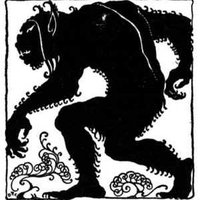
Grendel
CBUB Wins: 0
CBUB Losses: 1
CBUB Ties: 0
Win Percentage: 0%
Added by: patrickthekid
Read more about Grendel at: Wikipedia
Official Site: Public Domian
Grendel is one of three antagonist, along with Grendel's mother and the dragon, in the Anglo-Saxon epic poem Beowulf (AD 700–1000). Grendel is usually depicted as a monster, though this is the subject of scholarly debate. In the poem, Grendel is feared by all but Beowulf.
The poem Beowulf is contained in the Nowell Codex. As noted in lines 105–114 and lines 1260–1267 of Beowulf, Grendel and his mother are described as descendants of the Biblical Cain. Beowulf leaves Geatland in order to find and destroy Grendel, who has been attacking the mead hall Heorot, killing and eating anyone he finds there. Barring his lineage, all motives for his attacks are left up to the reader. Usually in most film or literature adaptations, Grendel attacks the hall after having been disturbed by the noise of the drunken revelers. One cryptic scene in which Grendel sits in the abandoned hall unable to approach the throne hints that his motives may be greed or revenge. After a long battle, Beowulf mortally wounds Grendel by ripping his arm off. Grendel dies in his cave under the swamp. Beowulf later engages in a fierce battle with Grendel's mother, over whom he triumphs. Following her death, Beowulf finds Grendel's corpse and removes the head, which he keeps as a trophy. Beowulf then returns to the surface and to his men at the "ninth hour" (l. 1600, "nōn", about 3pm). He returns to Heorot, where he is given many gifts by an even more grateful Hroðgar.
In 1936, J.R.R. Tolkien's Beowulf: The Monsters and the Critics discussed Grendel and the dragon in Beowulf. This essay was the first work of scholarship in which Anglo-Saxon literature was seriously examined for its literary merits—not just scholarship about the origins of the English language as was popular in the 19th century.
During the following decades, the exact description of Grendel became a source of debate for scholars. Indeed, because his exact appearance is never directly described in Old English by the original Beowulf poet, part of the debate revolves around what is known, namely his descent from the biblical Cain (who was the first murderer in the Bible).
CBUB Match Record:
| Result | Opponent | My Score | Their Score | |
|---|---|---|---|---|
| Loss | Heracles | 8 | to | 17 |
No Fantasy Draft Records Available
